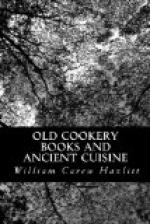ROYAL FEASTS AND SAVAGE POMP.
In Rose’s “School of Instructions for the Officers of the Mouth,” 1682, the staff of a great French establishment is described as a Master of the Household, a Master Carver, a Master Butler, a Master Confectioner, a Master Cook, and a Master Pastryman. The author, who was himself one of the cooks in our royal kitchen, tells Sir Stephen Fox, to whom he dedicates his book, that he had entered on it after he had completed one of a very different nature: “The Theatre of the World, or a Prospect of Human Misery.”
At the time that the “School of Instructions” was written, the French and ourselves had both progressed very greatly in the Art of Cookery and in the development of the menu. DelaHay Street, Westminster, near Bird-Cage Walk, suggests a time when a hedge ran along the western side of it towards the Park, in lieu of brick or stone walls; but the fact is that we have here a curious association with the office, just quoted from Rose, of Master Confectioner. For of the plot of ground on which the street, or at any rate a portion of it stands, the old proprieter was Peter DelaHaye, master confectioner of Charles II. at the very period of the publication of Rose’s book. His name occurs in the title-deeds of one of the houses on the Park side, which since his day has had only five owners, and has been, since 1840, the freehold of an old and valued friend of the present writer.
It may be worth pointing out, that the Confectionery and Pastry were two distinct departments, each with its superintendent and staff. The fondness for confections had spread from Italy—which itself in turn borrowed the taste from the East—to France and England; and, as we perceive from the descriptions furnished in books, these were often of a very elaborate and costly character.
The volume is of the less interest for us, as it is a translation from the French, and consequently does not throw a direct light on our own kitchens at this period. But of course collaterally it presents many features of likeness and analogy, and may be compared with Braithwaite’s earlier view to which I shall presently advert.
The following anecdote is given in the Epistle to Fox: “Many do believe the French way of working is cheapest; but let these examine this book, and then they may see (for their satisfaction) which is the best husbandry, to extract gold out of herbs, or to make a pottage of a stone, by the example of two soldiers, who in their quarters were minded to have a pottage; the first of them coming into a house and asking for all things necessary to the making of one, was as soon told that he could have none of these things there, whereupon he went away, and the other coming in with a stone in his knap-sack, asked only for a Pot to boil his stone in, that he might make a dish of broth of it for his supper, which was quickly granted him; and when the stone had boiled a little while, then he asked for a small bit of beef, then for a piece of mutton, and so for veal, bacon, etc., till by little and little he got all things requisite, and he made an excellent pottage of his stone, at as cheap a rate (it may be) as the cook extracted Gold from Herbs.”




